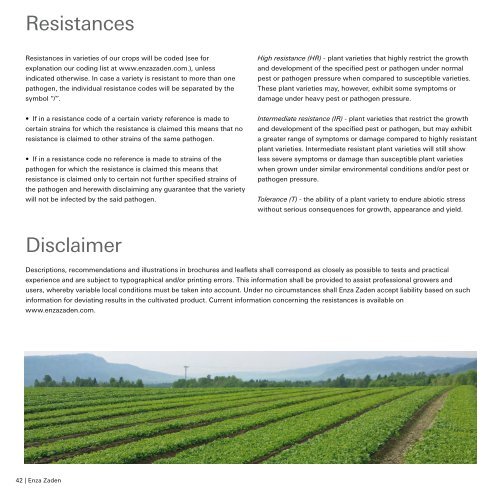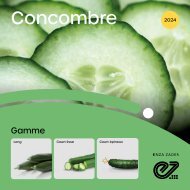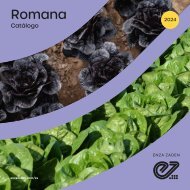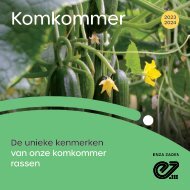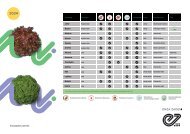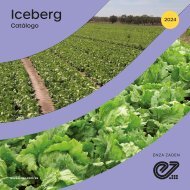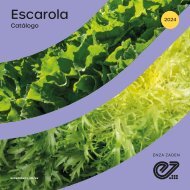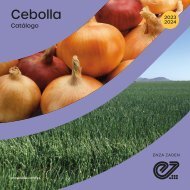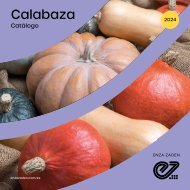lettuce brochure 2015
You also want an ePaper? Increase the reach of your titles
YUMPU automatically turns print PDFs into web optimized ePapers that Google loves.
Resistances<br />
Explanation of used abbreviations<br />
Resistances in varieties of our crops will be coded (see for<br />
explanation our coding list at www.enzazaden.com.), unless<br />
indicated otherwise. In case a variety is resistant to more than one<br />
pathogen, the individual resistance codes will be separated by the<br />
symbol “/”.<br />
High resistance (HR) - plant varieties that highly restrict the growth<br />
and development of the specified pest or pathogen under normal<br />
pest or pathogen pressure when compared to susceptible varieties.<br />
These plant varieties may, however, exhibit some symptoms or<br />
damage under heavy pest or pathogen pressure.<br />
• If in a resistance code of a certain variety reference is made to<br />
certain strains for which the resistance is claimed this means that no<br />
resistance is claimed to other strains of the same pathogen.<br />
• If in a resistance code no reference is made to strains of the<br />
pathogen for which the resistance is claimed this means that<br />
resistance is claimed only to certain not further specified strains of<br />
the pathogen and herewith disclaiming any guarantee that the variety<br />
will not be infected by the said pathogen.<br />
Intermediate resistance (IR) - plant varieties that restrict the growth<br />
and development of the specified pest or pathogen, but may exhibit<br />
a greater range of symptoms or damage compared to highly resistant<br />
plant varieties. Intermediate resistant plant varieties will still show<br />
less severe symptoms or damage than susceptible plant varieties<br />
when grown under similar environmental conditions and/or pest or<br />
pathogen pressure.<br />
Tolerance (T) - the ability of a plant variety to endure abiotic stress<br />
without serious consequences for growth, appearance and yield.<br />
Disclaimer<br />
Descriptions, recommendations and illustrations in <strong>brochure</strong>s and leaflets shall correspond as closely as possible to tests and practical<br />
experience and are subject to typographical and/or printing errors. This information shall be provided to assist professional growers and<br />
users, whereby variable local conditions must be taken into account. Under no circumstances shall Enza Zaden accept liability based on such<br />
information for deviating results in the cultivated product. Current information concerning the resistances is available on<br />
www.enzazaden.com.<br />
Lettuce Code English name Scientific name pathogen ISF Races/Strains Level of resistance<br />
Viruses LMV Lettuce mosaic Lettuce mosaic virus 1 IR<br />
Bacteria Ss Corky root<br />
Sphingomonas suberifaciens<br />
(ex Rhizomonas suberifaciens)<br />
Fungi Bl Downy mildew Bremia lactucae 16-32 HR<br />
IR<br />
Fungi Fol Fusarium wilt Fusarium oxysporum f.sp. lactucae 1 IR<br />
Insects Nr Lettuce leaf aphid Nasonovia ribisnigri 0 HR<br />
Insects Me Potato aphid Macrosiphum euphorbiae IR<br />
Insects Pb Lettuce root aphid Pemphigus bursarius HR<br />
Spinach Code English name Scientific name pathogen ISF Races/Strains Level of resistance<br />
Fungi Pfs Downy mildew<br />
Peronospora farinosa f.sp. spinaciae<br />
(ex. Peronospora effusa)<br />
1-15 HR<br />
42 | Enza Zaden<br />
Variety also available as organic seed from<br />
Enza Zaden | 43


